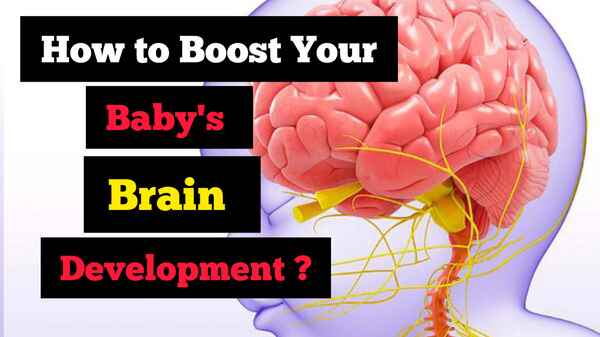As parents, we all strive to give our children the best possible start in life. From their first smile to their first steps, every milestone is a cause for celebration. One of the most fascinating aspects of early childhood development is the rapid growth and formation of your baby’s brain. During these crucial years, the brain is highly receptive to external stimuli making it the perfect time to nurture and enhance your baby’s cognitive abilities.
Let us explore various strategies and activities that can help boost your baby’s brain development, setting them on a path to lifelong learning and success. (Source)
Section 1: Early Stimulation for Cognitive Growth
Engage in Interactive Play:
Playtime is not just a way for your baby to have fun; it’s also a powerful tool for brain development. Engage in interactive play sessions that involve sensory experiences, such as touch, sound, and sight. Use colorful toys, sing songs, read aloud, and encourage your baby to explore their environment. By providing stimulating and interactive play opportunities, you create a rich learning environment that promotes cognitive growth.
Encourage Language Development:
Language acquisition plays a pivotal role in brain development during infancy. Talk to your baby frequently, using simple words and sentences. Describe the world around them, name objects, and engage in conversation, even if they cannot respond. Reading aloud is also an excellent way to expose your baby to new words, rhythms, and storytelling. These activities foster language skills, expand vocabulary, and lay the foundation for strong communication skills later in life.
Section 2: Creating a Nurturing Environment
Emphasize Sensory Stimulation:
The brain’s sensory pathways develop rapidly in early childhood, forming the basis for perception and understanding. Provide your baby with a variety of sensory experiences to stimulate their senses. Allow them to touch different textures, listen to soothing sounds, and explore various scents. Activities like finger painting, playing with water, or letting them explore safe household objects can help stimulate their senses and encourage brain connections.
Prioritize Healthy Nutrition:
Proper nutrition is crucial for brain development. Ensure that your baby receives a well-balanced diet rich in essential nutrients like omega-3 fatty acids, iron, and vitamins. Breast milk or formula should be the main source of nutrition for infants, while gradually introducing solid foods as they grow. Include a variety of fruits, vegetables, whole grains, and lean proteins in their diet to provide the necessary building blocks for optimal brain development.
Also, Read Know The Health Benefits of Pumpkin and Nutrition Facts

Section 3: Supporting Overall Development
Encourage Motor Skills Development:
Motor skills development is closely linked to brain development. Encourage your baby to engage in activities that promote both gross motor skills (large muscle movements) and fine motor skills (precise movements). Provide opportunities for crawling, tummy time, reaching for objects, and eventually walking. Offer age-appropriate puzzles, building blocks, and toys that require grasping and manipulation, helping to refine their motor skills and coordination.
Promote Social Interaction:
Social interaction is a key aspect of brain development, as it helps your baby understand emotions, develop empathy, and enhance communication skills. Arrange playdates with other children or join parent-baby groups where your little one can interact with peers. Encourage turn-taking, sharing, and positive social interactions. These experiences not only foster social skills but also stimulate neural connections in the brain.
Section 4: Essential Factors for Optimal Brain Development
Ensure Adequate Sleep:
Sleep plays a vital role in brain development and overall well-being. Establish a consistent sleep routine, ensuring your baby gets the recommended hours of sleep for their age. During sleep, the brain processes and consolidates information acquired throughout the day, strengthening memory and learning. A well-rested baby is more alert, focused, and receptive to new experiences.
Limit Screen Time:
Excessive screen time can hinder brain development in babies. The American Academy of Pediatrics recommends no screen time for children under 18 months, except for video chatting. As your baby grows, limit screen time and prioritize real-life interactions and activities instead. Too much screen time can disrupt sleep patterns, hinder language development, and interfere with cognitive growth.

Your baby’s brain is a marvel waiting to be shaped and nurtured. By actively engaging in their development through interactive play, language stimulation, sensory experiences, nutrition, motor skills development, social interaction, adequate sleep, and limited screen time, you can provide a strong foundation for their cognitive growth. Remember, every interaction, every word spoken, and every new experience matters. Cherish these early years and revel in the joy of watching your baby’s brilliance unfold.
Also, Read Dates Health Benefits: Nutritional Value and Uses
With your love, care, and dedication you can boost their brain development and set them on a path towards a bright and fulfilling future!





